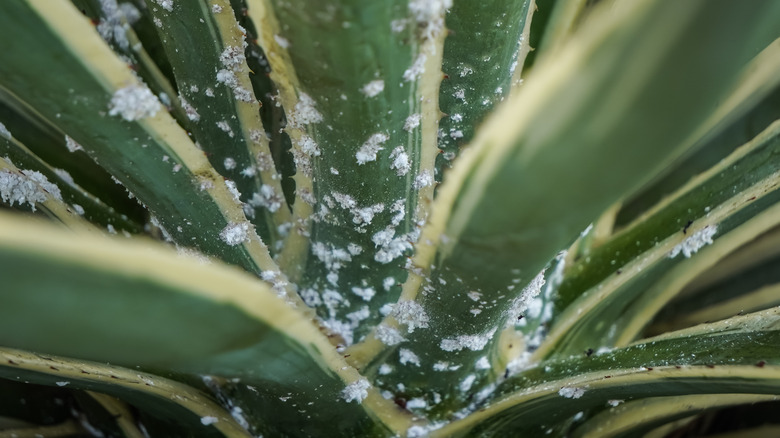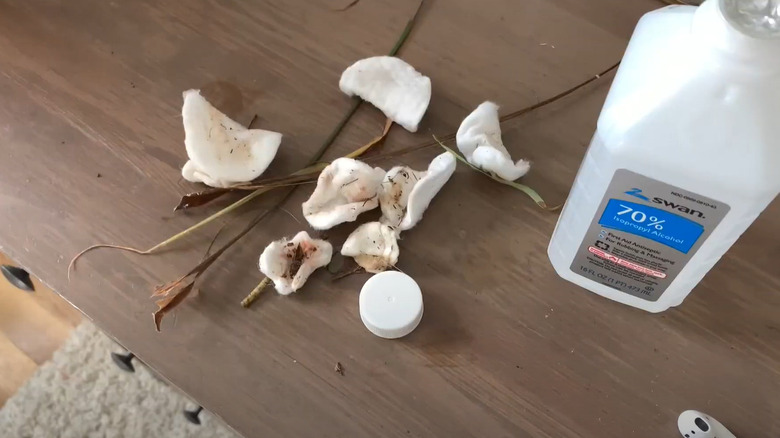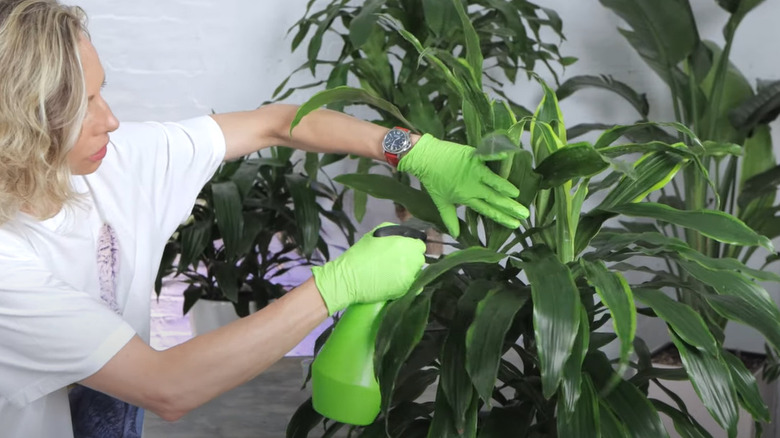This Common Household Item Will Solve All Your Mealybug Problems
We may receive a commission on purchases made from links.
That moment when you're admiring the vibrant display of your indoor jungle or the lush greenery of your garden oasis, then without warning, you notice them — mealybugs. Donned in fluffy white cloaks that mimic bits of cotton stuck to your precious plants, these green invaders are not just content with causing cosmetic damage; they aim to suck the life out of each leaf and stem, leaving behind a sad, wilted version of what was. The viscous honeydew they exude is a magnet for the relentless ants, with the generated sooty mold further blemishing your botanical beauties. So, how do you get rid of mealybugs on plants? While these critters scoff at conventional insecticide sprays, thanks to their protective coating, a household staple can save the day. Enter rubbing alcohol.
With a simple application, rubbing alcohol slices through mealybugs' protective wax layer with a lethal efficiency that most insecticides can only dream of. That instigates fatal dehydration for the pests but a saving grace for your plants — all without the potential collateral damage of harsh chemicals. Adding to the appeal of this hack of getting rid of mealybugs on plants naturally is the ease of use and availability of rubbing alcohol. However, note that the product's effectiveness hinges on direct contact, demanding thoughtful application. Also, don't overlook the requisite safety precautions; while there are countless clever ways to clean your home with rubbing alcohol, it's still a highly flammable liquid.
How to get rid of mealybugs with rubbing alcohol
When killing pests like mealybugs with rubbing alcohol, keep the concentration at 70% for effectiveness while being gentle on your plants. A 16-oz Dealmed Isopropyl Rubbing Alcohol 70% USP bottle, selling for $9.99 on Amazon, proves a worthy contender here. Pour this powerful potion into a bowl from which you can dampen your cotton balls or pads — or just gently tilt the rubbing alcohol against them.
With your well-equipped cotton, embark on a hunt through your plants' foliage, scouring for the telltale signs of mealybugs: those soft, white menaces lurking under leaves and in the secretive nooks of stems. Contact with alcohol-soaked cotton, while a mere dab, unleashes a fatal shower over the mealybugs, ensuring their swift defeat while sparing your plant the trauma of excessive alcohol exposure.
Making mealybugs a thing of the past lies not just in killing but also in carefully removing and disposing of the defeated pests. Yet, this initial encounter, while heroic, heralds the onset of a greater, ongoing struggle. Why, you might ask? These pesky little buggers are sneaky, their eggs poised for a resurgence that demands your vigilance. Re-engaging after a week with fresh alcohol-drenched cotton and renewed spirits should help intercept the bugs' lifecycle. However, when mealybug infestation has advanced beyond recovery, discarding the plant becomes a painful yet pragmatic decision to prevent further spread and loss.
Extra considerations for killing mealybugs on plants naturally
A methodical dabbing with an alcohol-soaked swab can effectively reach and eliminate mealybugs in the leaf axils inaccessible with a cotton pad or ball. However, rubbing alcohol spray will suffice for better coverage of more extensive invasions. By mixing a cup of rubbing alcohol with 30 fluid ounces of water and a splash of dish soap, you create a mixture that clings to the plants, thanks to the soap acting as a surfactant. This should be deployed cautiously; test it on one to two leaves and assess any potential adverse reactions for 24 hours. Upon passing this critical test, it's time to launch a full-scale assault, treating the plant from all angles — ensuring no leaf, stem, or topsoil is spared. A weekly or biweekly reapplication might be necessary.
A pivotal cautionary note when using rubbing alcohol is that it's highly flammable. Despite the quick evaporation from treated surfaces, lingering vapors still pose a significant fire risk. This demands keeping open flames or heat sources at a safe distance. Also, don't treat plants sitting on surfaces susceptible to damage by rubbing alcohol (especially treated wood). Relocating the plant or covering the vulnerable surface before spraying rubbing alcohol is advised. Seeking a gentler alternative to rubbing alcohol? Consider diluted essential oils, such as peppermint. But remember that cats and dogs can suffer harm from exposure to these oils, whether through inhalation, ingestion, or skin contact — so, tread wisely (per Pet Poison Helpline).


